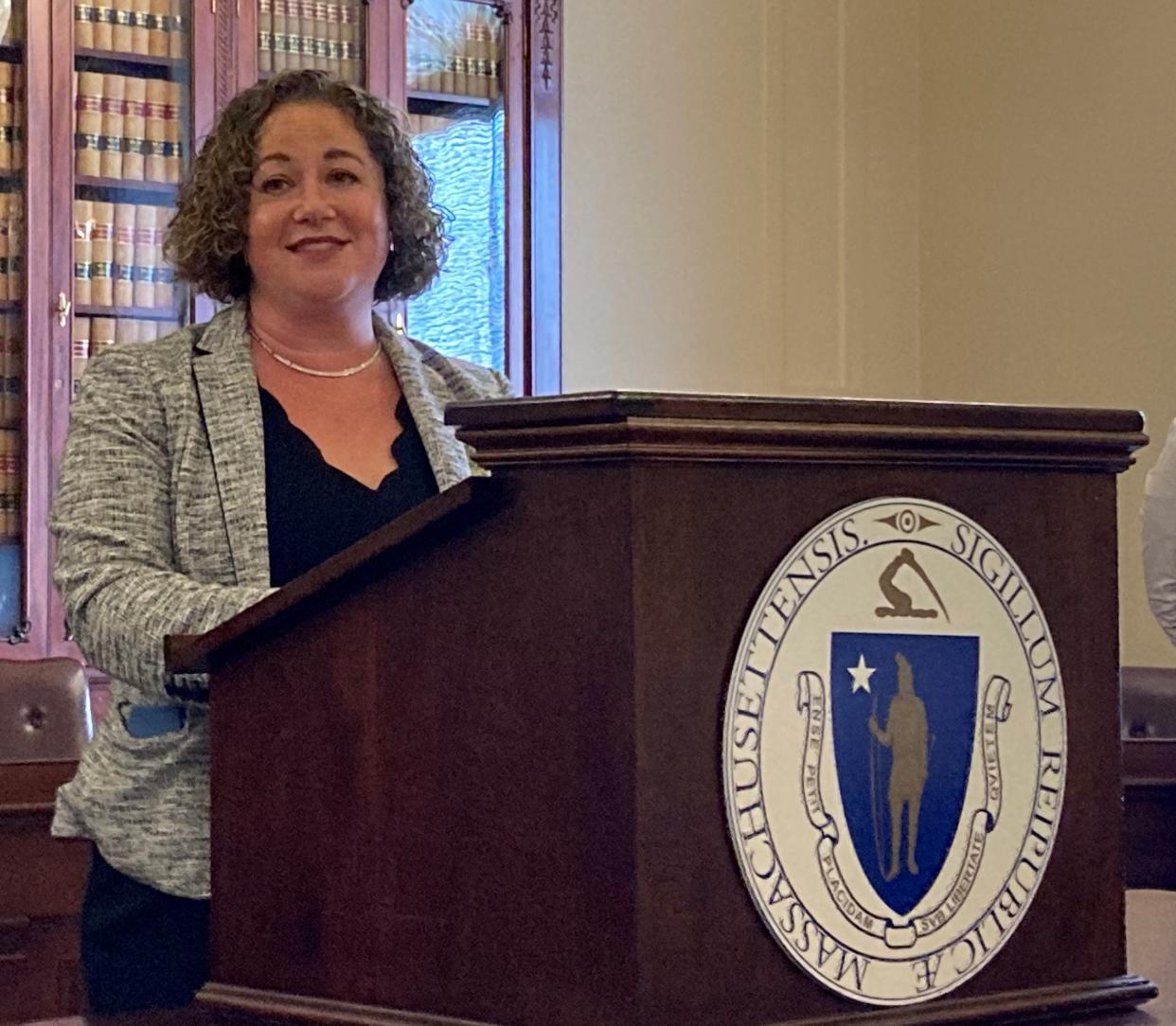MA lawmakers seek to close loopholes in state abortion laws, ease access for all residents

- Oops!Something went wrong.Please try again later.
- Oops!Something went wrong.Please try again later.
BOSTON — The topic on Massachusetts legislators' plates the Tuesday before Thanksgiving centered on reproductive care access and featured a proposal to close what some called loopholes in the state's abortion rights laws.
The joint bills filed by Sen. Rebecca Rausch, D-Needham, and Rep. Sally Kerans, D-Danvers, heard before the Joint Committee on the Judiciary throughout the afternoon, would eliminate the decades-old requirement that teenagers younger than 16 seek parental consent, or present their case before a judge, in order to access an abortion.
Other provisions would bar crisis pregnancy centers, some 30 of which exist in Massachusetts, from using deceptive language in advertising their services and propose that ultrasound providers in the centers be licensed and medically certified as competent to perform the service.
Another major provision would seek to bar the imposition of unnecessary rules, restrictions or regulations on providers.
"The future of abortion care is uncertain in this country," said Caroline Kimball-Katz, director of communications for Planned Parenthood League of Massachusetts. "Every abortion experience is unique and personal."
Delays in accessing reproductive health care can cause long-term challenges for women, said Elizabeth Janiak, an assistant professor of obstetrics, gynecology and reproductive biology at Harvard Medical School.
"The earlier women can access reproductive care, the better the outcome," Janiak said.
Parental consent law
In advocating for the elimination of the parental consent law for girls younger than 16, Janiak said that teens who find themselves pregnant at that age have often already been failed by the adults in their lives on all levels.
If they can't or won't involve their parents, the state law requires they apply for permission from a judge to get an abortion.
Abortions were significantly delayed for teenagers who opted to circumvent parental permission and access care through the court system, a delay on average of 15 days, according to a 2019 study led by Janiak and researchers at Planned Parenthood League of Massachusetts, Brigham and Women’s Hospital and Harvard Medical School. That difference resulted in one in three teenagers being ineligible for medication abortion by the time they presented for care.
“Teens 15 and younger represent the most vulnerable abortion patients, making subjecting them to the judicial bypass process and the delays it causes particularly cruel," Janiak said. "Young people deserve expeditious access to care just as much as all other abortion patients.”
Teenage and unwanted pregnancies have grave and indelible consequences for women, said Shoshanna Ehrlich, a UMass Boston professor and author, listing worse family outcomes, lower earning levels and the lowering of aspirations and accomplishments.
Somerville City Councilor Kristen Strezo spoke in support of language that would ban antiabortion crisis pregnancy centers from using deceptive advertising tactics in promoting their services and posing as medical facilities. She is also asking the state to require that employees at the centers undergo background checks.
"They claim to offer unbiased options, advertise free pregnancy tests and ultrasounds, and model fake medical language," Strezo said, noting that many of the crisis centers set up their operations close to facilities that offer abortions. "The staffers wear medical scrubs, carry clipboards, ask medical questions; yet there is no disclosure of staff affiliation or whether those performing ultrasounds are legally licensed to do so."
Some residents testifying before the Committee opted to pray
Michael McDonald told the legislators that he would pray for the conversion of Kerans and Rausch.
In his comments, McDonald said that abortion started as a means of genocide, to eliminate unwanted populations. Now, it's a way to eliminate families and parental love, McDonald said. He said he and his wife never regretted their decision to go forward with an unintended teenage pregnancy more than 20 years ago.
Steve Helper of Massachusetts Citizens for Life said he believes that women have the right to bodily autonomy, but that their rights are superseded once they have conceived a human life.
Referring to crisis pregnancy centers, Mark Carey, who is on the board of Boston Center for Pregnancy Choices, said the facilities are places of love and support for women facing pregnancy. They provide prenatal care Lamaze training and support, postpartum and even post-abortion.
"These centers help women through a hard time in their lives," Carey said. "We are there for women who don't choose to have an abortion."
Dr. Cheryl Hamlin, an obstetrician/gynecologist practicing at Mt. Auburn Hospital, classified the crisis pregnancy centers as "anti-choice centers," offering misleading and inaccurate information to women seeking information at challenging times.
She said she was escorting women into a clinic for reproductive health services in Cambridge when she was faced with a gauntlet of men holding signs urging her patients to "talk to me about a free ultrasound."
One of the bill's provisions would require the state Department of Public Health to maintain and annually update a list of reproductive health care provider facilities in the state and to educate the public about the lack of medical services provided at anti-abortion crisis pregnancy centers.
This article originally appeared on Telegram & Gazette: Parental consent, judicial bypass, restrict abortion access for teens

